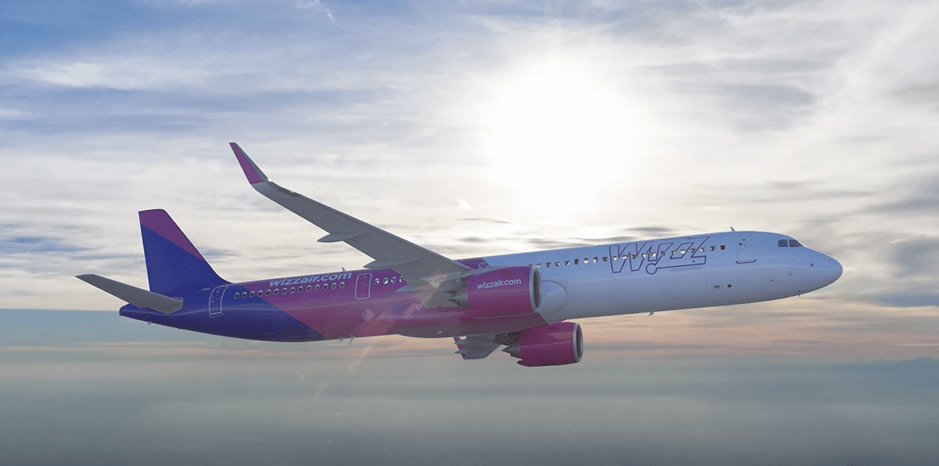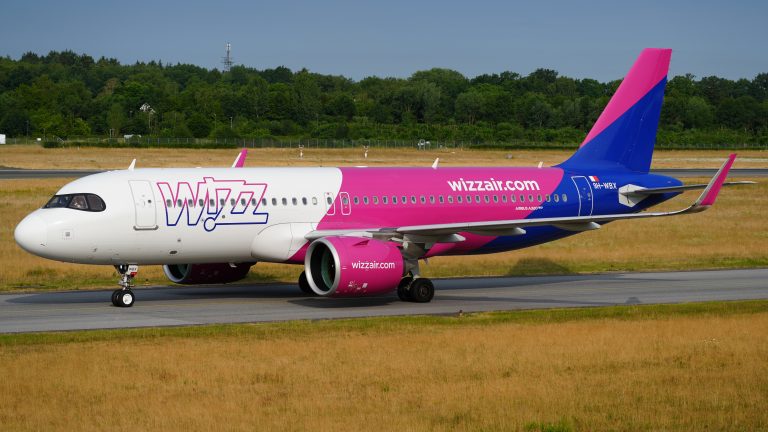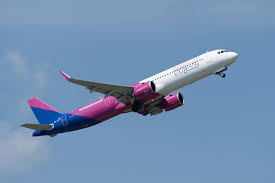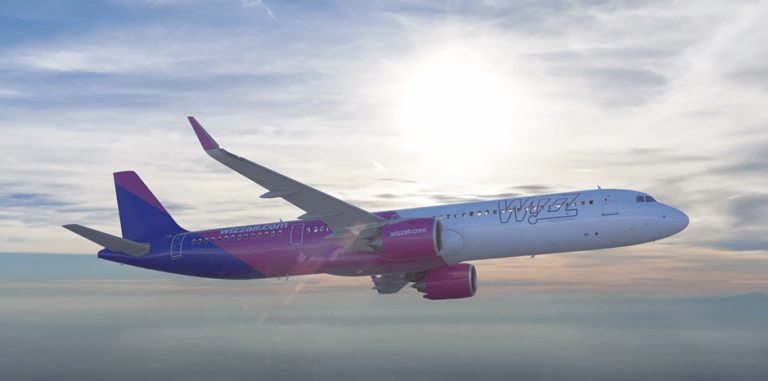Wizz Air Holdings Plc (LON:WIZZ) one of the most sustainable European airlines, has announced its unaudited results for the full year ended 31 March 2024.
| Full year to 31 March | 2024 | 2023 | Change |
| Passengers carried | 62,015,792 | 51,071,836 | 21.4% |
| Total revenue (€ million) | 5,073.1 | 3,895.7 | 30.2% |
| EBITDA (€ million)1 | 1,193.2 | 134.3 | 788.5% |
| EBITDA Margin (%)1 | 23.5 | 3.4 | 20.1ppt |
| Operating profit/(loss) for the period (€ million)2 | 437.9 | (466.8) | n.m. |
| Unrealised foreign currency gain (€ million) | 34.2 | 9.1 | 275.8% |
| Profit/(loss) for the period (€ million)2 | 365.9 | (535.1) | n.m. |
| RASK (€ cent) | 4.17 | 3.98 | 4.6% |
| Fuel CASK (€ cent) | 1.52 | 2.00 | (23.7)% |
| Ex-fuel CASK (€ cent) | 2.38 | 2.58 | (7.8)% |
| Total cash (€ million)1,3 | 1,588.9 | 1,529.0 | 3.9% |
| Load factor (%) | 90.1 | 87.8 | 2.4ppt |
| Period-end fleet size | 208 | 179 | 16.2% |
| Period-end seat count (thousand) | 68,813 | 58,190 | 18.3% |
1 For definition of alternative performance measures presented refer to “Glossary of terms” and “Alternative performance measures (APMS)” sections of this document. These measures incorporate certain non-financial information that management believes is useful when assessing the performance of the Group.
2 n.m.: not meaningful as a variance is more than (-)100 per cent.
3 Total cash comprises cash and cash equivalents (31 March 2024: €728.4 million; 31 March 2023: €1,408.6 million), short-term cash deposits (31 March 2024: €751.1 million; 31 March 2023: nil) and total current and non-current restricted cash (31 March 2024: €109.4 million; 31 March 2023: €120.4 million).
HIGHLIGHTS
▶Wizz Air celebrates 20 years since its first flight, with more than 390 million passengers carried since launch.
▶ASK capacity 24.5 per cent higher in F24 vs last year.
▶Record traffic of 62.0 million passengers in F24 (vs 51.1 million last year).
▶Unit revenue (RASK) up 4.6 per cent year-on-year, with ticket RASK +11.2 per cent and ancillary -2.6 per cent.
▶Full year revenue impact from Israel and wider region crisis circa €80 million.
▶Unit cost (CASK) down by 14.8 per cent year-on-year, with fuel CASK -23.7 per cent and ex-fuel -7.8 per cent.
▶EBITDA up significantly to €1.2 billion, in line with strong pre-pandemic performance.
▶Total cash balance at €1.59 billion, after repayment of a €500 million EMTN bond.
▶Significant improvement in operational metrics with operating fleet utilization at 12:25 hours vs 11:08 hours last year and with 65.3 per cent on-time performance, up from 56.2 per cent:
▶Maturing network with lower share of capacity operated on routes younger than three years (-7 percentage points vs last year).
▶Navigating GTF engine disruption: 45x aircraft-on-ground at F24-end; 47x as of 17 May 2024; Significant OEM compensation received for F24; Expect circa 50x aircraft grounded by end of H1 of fiscal F25.
▶Received delivery of 39 new A321neos; finalized 13 lease extensions and secured 11 more; received 20 GTF spare engines in F24 and advancing 8-10 more in H1 F25.
▶Close to flat YoY capacity projections for H1 F25 and full F25.
▶Reported CO2 emissions at 52.0 grams per passenger/km for the rolling 12 months to 31 March 2024 (vs 53.8 grams for F23) and set aspirational goal to use 10 per cent SAF by 2030. Improved to “B” score in the 2023 climate ranking by CDP, a two-band improvement vs Wizz Air’s 2022 score.
▶Trading in the financial year has been encouraging, with sustained demand and positive booking momentum for the summer.
József Váradi, Wizz Air Chief Executive Officer commented on the results:
“Sustained healthy demand for air travel across our markets was a defining feature of F24, signalling that the surge witnessed post pandemic has evolved into a longer-term trend in consumer behaviour. Wizz Air has been strongly positioned for this trend as reflected in our performance for the year.
We placed a sharp focus on increasing utilisation, improving load factors and lowering unit costs (fuel and ex-fuel), and continued to invest in our operations. Our efforts saw us carry a record number of passengers during the year, return to profitability and reduce financial leverage while maintaining our total cash position.
We responded rapidly to challenges during the year by flexing resources and commercial arrangements, and quickly redeploying capacity where needed, as renewed geopolitical instability emerged.
We also faced unprecedented supply chain disruption due to mandatory engine material inspections affecting our neo aircraft fleet.
Despite these challenges, our 8,000-strong workforce delivered an exceptional service, reflected across operational, financial and people metrics. I would like to thank each one of our employees for embodying the WIZZ spirit through their perseverance, dedication, passion and commitment in F24.”
Commenting on the outlook and current trading for the Company, József Váradi added:
“While some of the external challenges we experienced throughout F24, including groundings due to GTF engine inspections and geopolitical instability, are expected to persist in the coming year, we have proven that our model is agile, highly resilient and well positioned to mitigate the impact of these ongoing issues. This includes the current scale and diversity of our network, which means we are incredibly well placed to react quickly to issues as they arise.
While our capacity expectations for the year have been moderated in response to these changes in the operating environment, new aircraft deliveries persist, and our efforts to drive productivity and utilisation continue to deliver results. As we enter F25, demand for air travel remains robust, with no sign of abating in the near term, supporting a higher yield environment as capacity across the whole industry remains constrained.
Our current trading indicators are positive, with selling load factors trending higher year on year in the first two fiscal quarters and unit revenue (RASK) performing equally well.
We will continue to use the levers available to us to mitigate challenges in our sector, while relentlessly moving forward with the execution of our growth strategy, operating one of the most sustainable fleets in the industry and delivering value for all of our stakeholders.“
NEAR TERM AND FULL YEAR OUTLOOK
The near-term and full-year outlook is summarised as follows:
▶Capacity (ASKs): H1 F25 and F25 flat YoY;
▶Load factors: F25 92%;
▶Revenue: F25 RASK up high single digit YoY;
▶Cost: F25 ex-fuel CASK up high single digits YoY; and F25 fuel CASK ‘flattish’ YoY;
▶Net income: F25 in the range of €500-600 millions, at current FX rates;
▶Group Corporate Effective Tax Rate (ETR): 14%.
SUMMARY OF F24 FINANCIAL RESULTS
▶Total revenue increased by 30.2 per cent to €5,073.1 million, compared to €3,895.7 million in F23.
▶Fuel expenses decreased by 5.0 per cent to €1,855.7 million, compared to €1,954.4 million in F23.
▶Operating expenses (excluding fuel) increased by 15.4 per cent to €2,779.5 million, compared to €2,408.1 million in F23.
▶EBITDA grew substantially to €1,193.2 million, an increase of €1,058.9 million vs F23.
▶Operating profit was €437.9 million compared to an operating loss of €466.8 million in F23.
▶Net financing expenses decreased by 1.1 per cent to €96.8 million, compared to €97.9 million recorded in F23.
▶Net foreign exchange gain for F24 was €19.4 million, compared to a gain of €16.6 million in F23.
▶The Company recorded income tax credit of €24.8 million in F24 compared to the €29.5 million credit in F23.
▶Wizz Air reported a net profit of €365.9 million (F23: loss €535.1 million), returning to a full fiscal year of profitable operations.
▶At 31 March 2024, the Group held total cash of €1,588.9 million (including cash and cash equivalents of €728.4 million, €751.1 million of short-term cash deposits and €109.4 million of restricted cash), compared to €1,529.0 million in F23.
REVENUE AND COST HIGHLIGHTS
Total revenue increased driven by increases in capacity and load factor:
▶Passenger ticket revenue increased by 38.5 per cent to €2,804.2 million.
▶Ancillary revenue increased by 21.3 per cent to €2,268.9 million.
▶Total unit revenue increased by 4.6 per cent to €4.17 cents per available seat kilometre (ASK).
▶Ticket RASK increased by 11.2 per cent to €2.30 cent, reflecting a stronger load factor year-on-year and favourable pricing environment, specifically during the peak periods.
▶Ancillary RASK decreased by 2.6 per cent to €1.86 cent, mainly driven by the impact of Israel-Hamas war, denting demand in markets with high ancillary spend.
Total operating expenses increased by 6.3 per cent to €4,635.2 million in F24 from €4,362.5 million in F23:
▶Total CASK decreased to €3.90 cent in F24 from €4.58 cent in F23.
▶Ex-fuel CASK decreased by 7.8 per cent to €2.38 cent in F24 from €2.58 cent in F23, reflecting improved aircraft utilization and on-time performance, various savings in navigation and maintenance lines plus the effect of supplier compensation and gains from multiple spare engine financing in the last fiscal quarter (spare engines advanced to support GTF engine inspections).
▶Fuel CASK decreased by 23.7 per cent to €1.52 cent in F24, driven mainly by lower fuel charges, improved efficiency (expressed in metric tonnes per ASK: -1.6 per cent YoY) and additional benefit from the prospective rebalancing of free EU ETS emission quotas amongst industry players.
GTF ENGINE UPDATE
As of 17 May 2024, Wizz Air had 47 aircraft on the ground as a result of GTF engine-related matters. The Company is expecting circa 50 aircraft to be grounded by the end of the first half of fiscal F25 (approximately one year since the first aircraft was grounded in September 2023). We continue to maintain our assumption for the average expected shop visit time needed to return engines back to service of circa 300 days. In the meantime, more spare engine deliveries have been advanced and we are expecting further 8-10 new spare engine deliveries, most of which should be delivered by the end of June 2024. The total number of spare engines should exceed 50 by the end of this summer. Wizz Air has actively managed its fleet to minimise the impact of grounding, deploying the neo fleet to longer sectors, extending existing leases, securing third-party aircraft and advancing additional spare engines. As announced previously, we have secured an OEM support package (including compensation for grounded aircraft) and we expect to secure future compensation on similar terms for Q4 F25 and beyond.
GEOPOLITICAL CRISIS IN THE MIDDLE EAST
Wizz Air cancelled circa 6 per cent of its planned capacity for Q3 in early October, as the crisis emerged in Israel. Affected capacity was redeployed across the network at short notice, which contributed to lower load factors in the period. The conflict also impacted seasonal demand for travel to the nearby markets of Jordan and Egypt, whose capacity was also partially redeployed, accounting for an additional 3 per cent of the overall redeployed capacity. In Q4, these changes continued to weigh on load factors. The impact on full year Group revenue was circa €80 million. After careful consideration, we decided to restart operations to Tel Aviv in the last quarter of the year, and demand has been building steadily since. We continue to monitor developments in the region closely, with operational decisions driven solely by safety considerations.
OUR DIVERSIFIED GEOGRAPHIC FOOTPRINT AS A COMPETITIVE ADVANTAGE
In F24, despite industry-wide challenges, we continued to evolve our network. Our network now spans 924 routes, to 200 destinations in more than 50 countries, operated across our four airlines.
We continued to build on our strong presence in our operating markets, including maintaining Wizz Air’s dominant position in our core CEE countries. Wizz Air grew its market share to 27 per cent (+3 per cent points vs F23) in CEE. In Western Europe, we continued to provide a differentiated offer and act as a challenger to established peers across selected routes where we can offer a distinct price advantage. At London Luton, we are now the second largest airline, and have converted to operating an all Airbus A321neo fleet there one year earlier than planned. In F25, our Italian bases in Rome and Milan will see the largest schedule deployed to date.
Our Middle East route network is maturing as expected, and in line with the profile of our CEE network development. During the year, we added a further two aircraft in Abu Dhabi, exceeding initial fleet size expectations there.
FLEET DEVELOPMENTS
▶During F24 Wizz Air took delivery of 39 new A321neo aircraft, and 12 A320ceo aircraft were redelivered, ending the fiscal year with a total fleet of 208 aircraft: 40x A320ceo, 41x A321ceo, 6x A320neo and 121x A321neo.
▶During F24 delivered aircraft were financed through 30 sale and leaseback arrangements and 9 Japanese Operating Leases with Call Options (JOLCOs).
▶Wizz Air is extending leases for eleven additional aircraft from the existing fleet (on top of thirteen completed). The lease extensions range between two and four years and are being agreed at both discounted and original lease rates.
▶Wizz Air also secured three former Wizz Air aircraft on dry lease (to be delivered in F25), while also adding eight wet leased aircraft for periods ranging from six to twelve months, providing additional capacity in F25.
▶The average age of the fleet currently stands at 4.3 years, the youngest fleet among major European airlines, while the average number of seats per aircraft has climbed to 224 as at March 2024.
▶The share of new “neo” technology aircraft within Wizz Air’s fleet has increased to 61 per cent by the end of F24.
▶During F25 we expect 27 new A321neo aircraft deliveries, including a first XLR, three A320ceo aircraft on dry lease while nine A320ceo aircraft will be returned to lessors and will exit the fleet.
▶As at 31 March 2024, Wizz Air’s delivery backlog comprises a firm order for 13x A320neo, 266x A321neo and 47x A321XLR aircraft, a total of 326 aircraft.
▶The table below provides fleet composition for the past, present and coming fiscal year, including effected lease extensions and dry leases. Figures reflect Airbus contractual delivery timelines. F25 includes Airbus communicated delivery delays, whereas F26 does not. The Company expects 30-35 aircraft to be delayed in F26.
| March 2024 | March 2025 | March 2026 | |
| Actual | Planned | Planned1 | |
| A320ceo (180/186 seats) (9x extensions) | 40 | 34 | 21 |
| A320neo (186 seats) | 6 | 6 | 9 |
| A321ceo (230 seats) (4x+11x extensions) | 41 | 41 | 40 |
| A321neo (239 seats) | 121 | 147 | 219 |
| A321neo XLR (239 seats) | – | 1 | 10 |
| Fleet size (with finalised extensions) | 208 | 229 | 299 |
1 The Company expects 30-35 aircraft to be delayed.
FINANCIAL UPDATE
▶During F24 Wizz Air continued to apply its jet fuel and foreign currency hedging policy. As of 17 May 2024, using jet fuel zero-cost collars and jet fuel swaps, Wizz Air has a hedge coverage of 59 per cent for its jet fuel needs for the F25 using mostly zero-cost collars at a price of 750.0/859.0 $/mT and jet fuel swap at a price of 811.0 $/mT. For F26, the coverage is 10 per cent at the price of 737.0/850.0 $/mT. The jet fuel-related EUR/USD FX coverage stands at 62 per cent for F25 at 1.0790/1.1222, while the coverage for F26 stands at 11 per cent at 1.0820/1.1249 rates.
▶In the second half of fiscal F24 Wizz Air repaid one of its two outstanding €500 million bonds, issued under the €3 billion EMTN programme. Following the bond repayment, Wizz Air renewed the EMTN programme.
▶Fitch Ratings has affirmed Wizz Air Holdings Plc’s long-term issuer default rating and senior unsecured rating at ‘BBB-‘.
▶The outstanding balance on the PDP facility at the end of March 2024 stands at $222.9 million (31 March 2023: $274.3 million).
▶The Company signed a repurchase agreement for its inventory of EU emissions trading scheme credits, receiving €253.6 million. The inventory must be repurchased from the counterparty by September 2024.
▶During the year, Wizz Air secured further EUR currency leases. It has signed more finance-type leases (in addition to JOLCO), becoming effective with F25 deliveries. Like JOLCO, these leases offer the option to purchase the aircraft during the lease, are recognized as aircraft assets on balance sheet and depreciate over aircraft’s useful life, as opposed to its lease term.
▶Wizz Air received 20x GTF spare engines in F24 and is advancing a further 8-10x in F25 to limit the grounding of the NEO aircraft fleet (total GTF spare pool to exceed 50x by the end of summer 2024).
▶Net debt1 at the end of 31 March 2024 was €4,790.2 million vs €3,892.8 million at the end of 31 March 2023, while the Company’s leverage ratio1 (net debt to EBITDA) decreased from 29.0 at F23 year end to 4.0. Over the same period, liquidity1 reduced to 29.2% per cent from 36.2 per cent .
▶The Company received OEM compensation from Pratt & Whitney related to the GTF engine issues. The compensation relates to costs incurred in the period ended 31 March 2024 and is presented within net other income/(expense) in the consolidated statement of comprehensive income.
1 For further definition of non-financial measures presented refer to “Glossary of terms” and “Alternative performance measures (APMS)” sections of this document.
ESG UPDATE
Environment
In the fiscal year 2024 Wizz Air achieved further progress on the sustainability agenda:
▶Reduced CO2 emissions per passenger kilometre to 52.0 grammes in F24 (vs 53.8 grammes in F23).
▶Wizz Air took a significant step by investing in SAF companies, first Firefly, then CleanJoule, and partnering with various SAF suppliers.
▶We adopted an aspirational goal to fuel our flights with a 10 per cent sustainable aviation fuel blend by 2030.
▶During the year we performed fully electric turns of aircraft in Rome Fiumicino and Budapest airports.
The efforts have not gone unnoticed, Wizz Air has won several industry awards for our outstanding performance:
▶Most Sustainable Low-Cost Airline title for the third consecutive year at the World Finance Sustainability Awards 2023.
▶Global Environmental Sustainability Airline Group of the Year for the second consecutive year at the CAPA Aviation Summit.
▶Strategic Investment of the Year – Europe at the 2023 SAF Investor Awards, for its investment in Firefly.
▶Improved to “B” score in the 2023 climate ranking by CDP, reaching “management level”, a two-band improvement vs Wizz Air’s 2022 score.
People
▶Wizz Air is an ethnically diverse and inclusive professional organisation with over 109 nationalities within its employee base (84 in cabin crew, 60 in the flight crew and 61 in the office).
▶In F24, Wizz Air conducted its seventh employee engagement survey. Company wide engagement score reached 7.1, making a notable increase of 0.7 compared to previous year.
Governance
▶Phit Lian Chong was appointed to the Board as a non-executive director in July 2023 and subsequently to the Audit and Risk Committee in January 2024.
▶The Company welcomed four executives during the year, Silvia Mosquera as Executive Vice President and Group Chief Commercial Officer, Boris Rogoff as Central Operations Officer, Janos Pal as Revenue Officer, and Ervin Banyai as Digital Officer.
OTHER DEVELOPMENTS
▶Wizz Air celebrated 20 years since its first flight on 19 May 2004 from Katowice, Poland to London, Luton UK. Today, Wizz Air is the #1 airline in CEE with a total market share of 27 per cent.
▶During the past quarter Wizz Air moved to a bigger and new headquarter office in Budapest, that offers optionality to add further space in the coming years as the company pursues a fleet of 500 aircraft by the end of the decade.
▶Wizz Air announced the May 2024 opening of its second training center in Rome. The training center will house three full-flight simulators with capacity to train over 4800 Wizz Air pilots yearly.








































